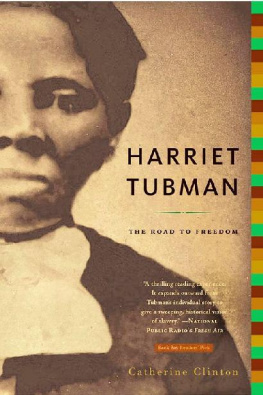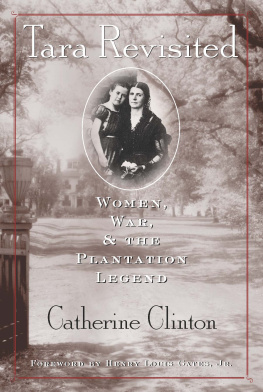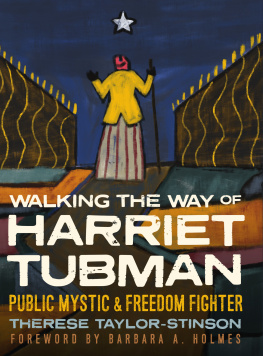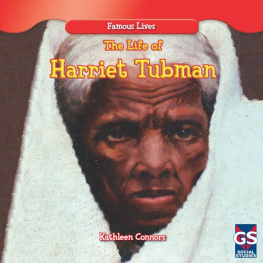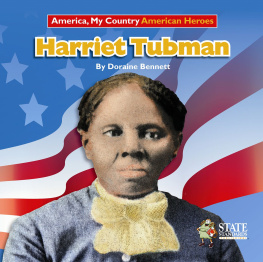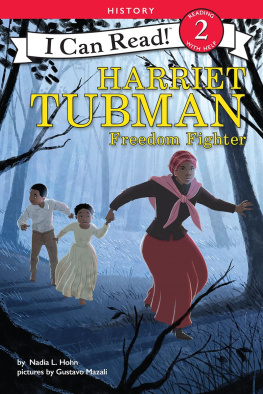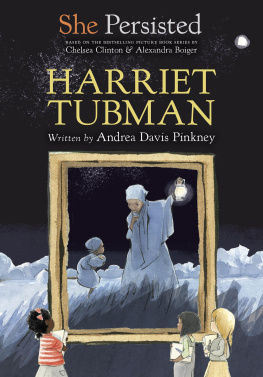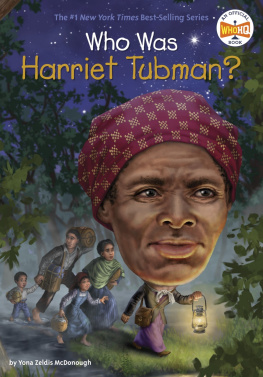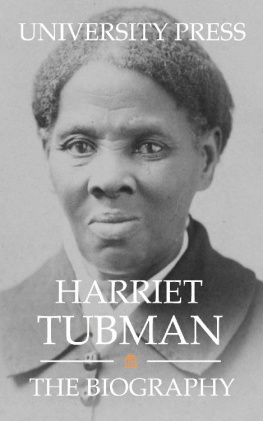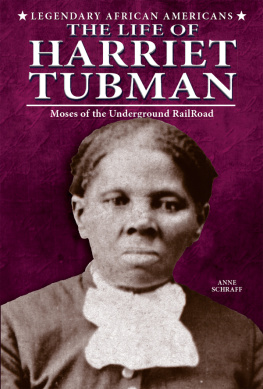Catherine Clinton - Harriet Tubman: The Road to Freedom
Here you can read online Catherine Clinton - Harriet Tubman: The Road to Freedom full text of the book (entire story) in english for free. Download pdf and epub, get meaning, cover and reviews about this ebook. year: 2004, publisher: Hachette UK, genre: Non-fiction. Description of the work, (preface) as well as reviews are available. Best literature library LitArk.com created for fans of good reading and offers a wide selection of genres:
Romance novel
Science fiction
Adventure
Detective
Science
History
Home and family
Prose
Art
Politics
Computer
Non-fiction
Religion
Business
Children
Humor
Choose a favorite category and find really read worthwhile books. Enjoy immersion in the world of imagination, feel the emotions of the characters or learn something new for yourself, make an fascinating discovery.
- Book:Harriet Tubman: The Road to Freedom
- Author:
- Publisher:Hachette UK
- Genre:
- Year:2004
- Rating:3 / 5
- Favourites:Add to favourites
- Your mark:
- 60
- 1
- 2
- 3
- 4
- 5
Harriet Tubman: The Road to Freedom: summary, description and annotation
We offer to read an annotation, description, summary or preface (depends on what the author of the book "Harriet Tubman: The Road to Freedom" wrote himself). If you haven't found the necessary information about the book — write in the comments, we will try to find it.
Harriet Tubman: The Road to Freedom — read online for free the complete book (whole text) full work
Below is the text of the book, divided by pages. System saving the place of the last page read, allows you to conveniently read the book "Harriet Tubman: The Road to Freedom" online for free, without having to search again every time where you left off. Put a bookmark, and you can go to the page where you finished reading at any time.
Font size:
Interval:
Bookmark:
Copyright 2004 by Catherine Clinton
All rights reserved. No part of this book may be reproduced in any form or by any electronic or mechanical means, including information storage and retrieval systems, without permission in writing from the publisher, except by a reviewer who may quote brief passages in a review.
Little, Brown and Company
Hachette Book Group
237 Park Avenue
New York, NY 10017
Visit our website at www.HachetteBookGroup.com.
The Little, Brown and Company name and logo are trademarks of Hachette Book Group, Inc.
First eBook Edition: February 2004
ISBN: 978-0-7595-0977-1
Contents
Also by Catherine Clinton
THE PLANTATION MISTRESS:
WOMANS WORLD IN THE OLD SOUTH
THE OTHER CIVIL WAR:
AMERICAN WOMEN IN THE NINETEENTH CENTURY
HALF SISTERS OF HISTORY:
SOUTHERN WOMEN AND THE AMERICAN PAST
TARA REVISITED:
WOMEN, WAR, AND THE PLANTATION LEGEND
I, TOO, SING AMERICA:
THREE CENTURIES OF AFRICAN AMERICAN POETRY
CIVIL WAR STORIES
FANNY KEMBLES CIVIL WARS
FANNY KEMBLES JOURNALS
A POEM OF HER OWN:
VOICES OF AMERICAN WOMEN YESTERDAY AND TODAY
For
John Hope Franklin
Remembering Harriet Tubman

O NE HUNDRED YEARS AGO in the small upstate New York town of Auburn, a charity home named after antislavery martyr John Brown was planned. The modest, two-story brick structure was not remarkable in any other way, except that it would fulfill a lifelong dream of the ex-slave who had settled there in the decade before the Civil War: Harriet Tubman. Certainly she would have preferred that in the new twentieth century her rising and flourishing nation might provide for the aged and indigent, the orphaned and disabled, of whatever color. But while so much had changed since she was born into bondage in Maryland in 1825, Harriet Tubman knew how America had also stayed the same. There would always be those in need, and even as she approached the age of eighty, Tubman continued to extend a helping hand. She would never give up the struggle for racial justice. If she could not fulfill her dream of establishing the home, which all blacks deserved, then she would die trying.
After first striking out for freedom as a young enslaved woman in 1849, Tubman returned south again and again to help scores of slaves escape with the help of the Underground Railroad. When the Civil War broke out, the struggle went above ground, and Tubman was an active participant in the fight to defeat the Confederacy. Once the Rebels finally surrendered, however, Tubman knew the fight was not over. She had given so much to her countrybut she knew it would be a continuing battle for blacks to be granted rights associated with genuine freedom. And as a woman, Tubman recognized that the struggle for womens rights would be an even harder road ahead.
In 1865 Tubman returned to her adopted home, Auburn, New York, which had sheltered and protected her and her extended family since before the war. She wanted to carry on her campaigns for justice within this community and decided to maintain an informal shelter in the house she had bought from a patron, Secretary of State William Seward. Over time, she was able to expand her horizons and purchased an even larger parcel of land in hopes of establishing a separate charity institution. With the help of her church, this dream was eventually realized. In 1908 the Harriet Tubman Home was dedicated. Five years later, Harriet Tubman was dead.
Harriet Tubman had been a liberator, a woman who stood up to the slave power, and a warrior whose actions spoke louder than words. Unlike most women born into slavery, she seized the road to freedomnot just for herself, but also for her family and others during her decade-long association with the Underground Railroad. This bravery earned her a fierce contemporary reputation. She was on the slaveholders most wanted list with reportedly a steep price on her head. Posters with a description of Moses, as she was called, were prominently plastered throughout the upper South until the Civil War broke out.
During the war, in addition to nursing soldiers and assisting slave refugees in the coastal South, she took on a military role, organizing scouts and spies. Tubman led rescue missions to free slaves deep into occupied South Carolina. Her notoriety, her association with the infamous John Brown, her utter defiance of nearly every stereotype associated with those held in bondage, made her an anomaly. But the way in which she is remembered clearly has its own complexities, its own history, as well.
Harriet Tubman became a celebrity during her years with the Underground Railroad and was an acknowledged war hero for the small circle who followed her Union career. Yet the larger public rarely gained insight into her character or her motives, as she became in some ways a symbol rather than a flesh-and-blood figure by the end of the nineteenth century. At the turn of the twentieth century there were occasional articles and tributes published on this remarkable woman, but by the time of her death, in 1913, only those who had been directly associated with Tubman kept her memory alive.
In recent years, Americans have enjoyed a renewed appreciation of the champions of black freedom. Frederick Douglass is the subject of multiple biographers, and a lucrative historical book prize is named in his honor. The accomplishments of Martin Luther King Jr. are celebrated on a national holiday and analyzed in a continuing flood of scholarly and popular imprints. Sojourner Truth, Marian Anderson, Zora Neale Hurston, and even Rosa Parks have all commanded scholarly biographical attention, while Harriet Tubman has languished. One authorized biography appeared more than a hundred years ago, and another was written by a journalist born in her adopted hometown of Auburn, New York. After multiple rejections, his manuscript was finally published by a black press in 1943.
For the most part, the life of Harriet Tubman has been confined to the storybook world of following the drinking gourd and freedom quilts. These accounts are more folkloric than analytical, more riddled with inaccuracies than concerned with historical facts. Much like Sally Hemings before her, Harriet Tubman has been subjected to more fictional treatments than serious historical examinations, a reflection not of her place in the American past but of a failing on the part of the academy. This absence of scholarship must be recognized as a form of disremembering. While Tubman was alive in the imaginations of schoolchildren and within popular and underground culture, she was a mystery to professional historians, who consistently mentioned her but failed even to set the record straight about her role and contributions.
Over the past half century there has been a renewed interest in the life experience of slaves as well as a flood of literature concerning the way in which slavery shaped our American past. Concurrently, scholarship in womens history has blossomed. Within these twin literary revivals the lives of women slaves have emerged, and the experiences of fugitive and runaway slaves have been tentatively and creatively mapped. Scholarship on the worlds within slave cabins and those behind the scenes of the Underground Railroad has always been handicapped by the lack of traditional documentation.
But scholars in the twenty-first century have persisted, re-creating with ingenuity and imagination the lives of those denied literacy and of those forced to carry on clandestine struggles. Major historical prizes have been awarded to scholars who have created histories of those who did not leave behind diaries and letters. Underground history is gaining ground, as oral history and other methods of recovering lost experiences have proved fruitful. Scholars within and outside the academy are by necessity becoming more adventurous, recognizing there is a world outside the archives which requires our attention as well.
Next pageFont size:
Interval:
Bookmark:
Similar books «Harriet Tubman: The Road to Freedom»
Look at similar books to Harriet Tubman: The Road to Freedom. We have selected literature similar in name and meaning in the hope of providing readers with more options to find new, interesting, not yet read works.
Discussion, reviews of the book Harriet Tubman: The Road to Freedom and just readers' own opinions. Leave your comments, write what you think about the work, its meaning or the main characters. Specify what exactly you liked and what you didn't like, and why you think so.

